by Ayuska Motha, AIWC Cologne
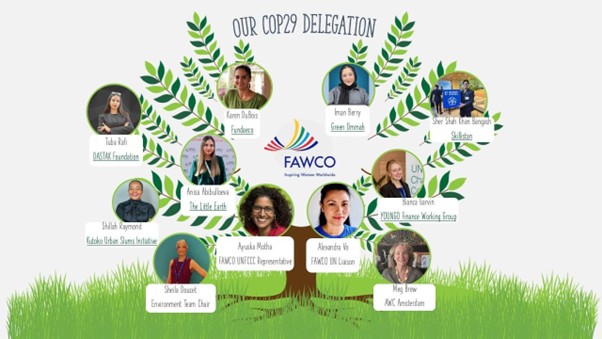
After nine years representing FAWCO at annual UN Climate Summits, this year was exceptional.
Why?
Because in a small but sure way, FAWCO was able to increase the representation of historically underrepresented voices within the UN climate negotiations, known as the Conference of the Parties (COP). Data have shown that there is an imbalance in who attends, participates and eventually makes the decisions at the annual climate change summits. For the past 29 COPs, there have been more men than women, the perspectives of the younger and future generations have been mostly ignored, and Indigenous people and local communities lack a seat at the decision-making table. Until everyone’s perspectives can be taken into account, the urgency of the crisis cannot be reflected in the decisions being made.
Above is an image of the complete in-person FAWCO delegation along with Alexandra Vo (FAWCO UN Liaison) and myself (FAWCO UNFCCC Representative), also acting as the coordinator and head of delegation respectively.
How?
For COP29, FAWCO was in the privileged position to receive seven in-person badges, which is the most FAWCO has ever received while I have been involved. Many civil society organizations received a severely reduced quota of badges this year, but FAWCO more than doubled their quota.
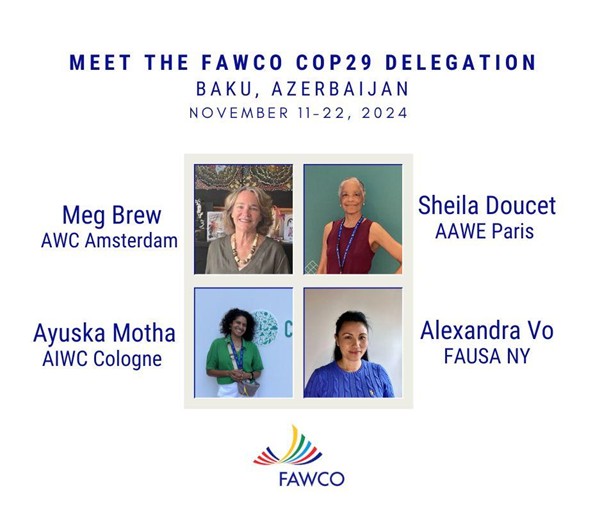 Powered by this authority, Alexandra and I set a goal to give voice to marginalized communities at COP29 by allocating a portion of our badges to underrepresented advocates. We worked for months ahead of the summit to facilitate the in-person participation of eight non-FAWCO participants and the virtual participation of six delegates from around the world. I coordinated with the Women and Gender Constituency (WGC), WGC member organizations, the Gender Just Climate Solutions coordination team, as well as Indigenous women’s organizations and Indigenous youth representatives. Alexandra coordinated with the Youth and Children’s Constituency (YOUNGO) until the very last days prior to COP29. Our delegates traveled from Pakistan, Turkey, Canada, Kenya, Tajikistan, Guatemala and the UK, while others connected online from Egypt, India, Malawi and Sri Lanka. In addition, four FAWCO delegates from four different clubs were able to be in Baku (the image to the right depicts our in-person FAWCO members) and three attended virtually: Amanda Drollinger (Scotland), Joan Evers (Spain) and Halima Dube (Kenya). FAWCO showcased its international solidarity!
Powered by this authority, Alexandra and I set a goal to give voice to marginalized communities at COP29 by allocating a portion of our badges to underrepresented advocates. We worked for months ahead of the summit to facilitate the in-person participation of eight non-FAWCO participants and the virtual participation of six delegates from around the world. I coordinated with the Women and Gender Constituency (WGC), WGC member organizations, the Gender Just Climate Solutions coordination team, as well as Indigenous women’s organizations and Indigenous youth representatives. Alexandra coordinated with the Youth and Children’s Constituency (YOUNGO) until the very last days prior to COP29. Our delegates traveled from Pakistan, Turkey, Canada, Kenya, Tajikistan, Guatemala and the UK, while others connected online from Egypt, India, Malawi and Sri Lanka. In addition, four FAWCO delegates from four different clubs were able to be in Baku (the image to the right depicts our in-person FAWCO members) and three attended virtually: Amanda Drollinger (Scotland), Joan Evers (Spain) and Halima Dube (Kenya). FAWCO showcased its international solidarity!
Disappointingly, due to lack of funding, not even one of the Indigenous women leaders nor Indigenous youth delegates we had been coordinating with was able to attend. While we were not able to support them in a manner that we were hoping to, we have not given up and will start the process earlier in 2025 for COP30 in Brazil.
We are thrilled to share with you more information on each of our outstanding non-FAWCO delegates and their fabulous work.
Anisa Abibulloeva
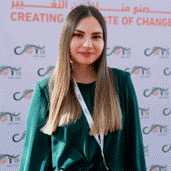 Anisa Abibulloeva is a youth engagement specialist and project coordinator at Little Earth (a youth environmental organization), and an environmental activist with seven years of experience in environmental advocacy. Anisa also serves as a board member of the Climate Action Network for Eastern Europe, Caucasus, and Central Asia (CAN EECCA).
Anisa Abibulloeva is a youth engagement specialist and project coordinator at Little Earth (a youth environmental organization), and an environmental activist with seven years of experience in environmental advocacy. Anisa also serves as a board member of the Climate Action Network for Eastern Europe, Caucasus, and Central Asia (CAN EECCA).
At COP28, last year, Anisa was among 100 youth delegates in the first International Youth Climate Delegates Programme. Her efforts are focused on engaging youth in climate action and supporting rural, marginalized communities in adapting to climate challenges through green technologies. Anisa is also dedicated to climate advocacy, with a particular emphasis on empowering youth and women to strengthen the environmental movement.
Anisa is this year’s winner of the technical solutions category of the Gender Just Climate Solutions Award for her project called “Tajik mountain women leading solar transformation“ with Little Earth in Tajikistan.
Little Earth is an environmental NGO which aspires to support women living in the mountains in obtaining financial independence, build resilient communities and drive forward a clean energy revolution in Tajikistan on a grassroots, small-scale level.
In the remote Yagnob Valley, 40 women from 11 villages were trained to build, maintain and use solar energy and green resource-efficient technologies. Previously, the villages depended on firewood and other polluting fuel sources, which required large amounts of manual labour and produced high levels of air pollution. The environmental benefits from transitioning to solar energy are myriad: the change has reduced the environmental degradation to the fragile ecosystems in the valley as well as improving the health and safety of the communities living there by reducing the amount of harmful exhaust fumes. Moreover, due to its focus on gender equality, this initiative has strengthened Yagnob Valley women’s technical skills, facilitated recognition of their unpaid labor, and involved them in decision-making on both the local and national levels. Take a look at this short Youtube clip of the project.
Sher Shah Khan Bangash
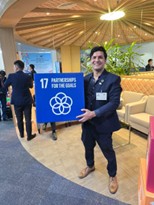 Sher Shah Khan Bangash is a young social entrepreneur and founder of Skillistan, which is on a mission to empower Youth for Sustainable Growth via Green and Digital Skills. He’s a sustainable development scholar and dedicated advocate for global sustainability, with over 15 years of experience advancing development on multiple fronts. As the Founder and CEO of Skillistan, Sher Shah is committed to empowering youth at the grassroots level. He began his volunteering journey as a teenager, focusing on supporting conflict-affected youth. Over the years, he has personally mentored and trained more than 10,000 young people worldwide through over 200 workshops in online, offline and hybrid formats, fostering leaders in sustainability and Sustainable Development Goals (SDG) activism.
Sher Shah Khan Bangash is a young social entrepreneur and founder of Skillistan, which is on a mission to empower Youth for Sustainable Growth via Green and Digital Skills. He’s a sustainable development scholar and dedicated advocate for global sustainability, with over 15 years of experience advancing development on multiple fronts. As the Founder and CEO of Skillistan, Sher Shah is committed to empowering youth at the grassroots level. He began his volunteering journey as a teenager, focusing on supporting conflict-affected youth. Over the years, he has personally mentored and trained more than 10,000 young people worldwide through over 200 workshops in online, offline and hybrid formats, fostering leaders in sustainability and Sustainable Development Goals (SDG) activism.
In his role as the Local Conferences of Youth (LCOY) Pakistan lead, Sher has amplified the voices of Pakistani youth in climate advocacy. This year, he has organized 7 Provincial/Territorial LCOYs across Pakistan, mobilizing over 3,000 youth in physical Climate Governance Spaces. This journey culminated in the national LCOY, held November 2–3, 2024, which provided a platform for thousands of young leaders to address pressing climate issues on a grand scale.
Iman Berry
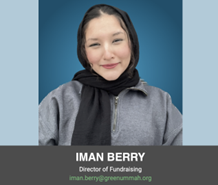 Iman Berry is a fifth-year business administration and political science student at Western University and the Ivey School of Business. Iman is passionate about political activism, has worked in student advocacy groups, and is currently serving on Western University’s Senate. She also serves as Director of Fundraising at Green Ummah organization, whose vision is a Canadian Muslim community fully engaged in building a green future. She is passionate about international environmental issues and has worked at the UN International Organization for Migration in the Labour Mobility and Social inclusion group addressing the increasingly important issue of climate migrants. Iman hopes to continue to foster inclusion and justice in the environmental movement as well as explore environmental policy implications.
Iman Berry is a fifth-year business administration and political science student at Western University and the Ivey School of Business. Iman is passionate about political activism, has worked in student advocacy groups, and is currently serving on Western University’s Senate. She also serves as Director of Fundraising at Green Ummah organization, whose vision is a Canadian Muslim community fully engaged in building a green future. She is passionate about international environmental issues and has worked at the UN International Organization for Migration in the Labour Mobility and Social inclusion group addressing the increasingly important issue of climate migrants. Iman hopes to continue to foster inclusion and justice in the environmental movement as well as explore environmental policy implications.
Karen Dubois
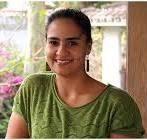 Karen Dubois is the 2019 winner of the Gender Just Climate Solution award for the project “Women and Girls, Healthy and Empowered” that FUNDAECO is leading in Guatemala. FUNDAECO breaks traditional cultural barriers to ensure the sexual reproductive health rights of adolescent girls in more than 100 Mayan and Q’echqi communities of Guatemala are a basis for their involvement in forest conservation. Twenty-two health clinics, established in Protected Areas of Izabal, have provided regular care and counselling to 50,000 patients (2/3 women), significantly reducing teenage pregnancies, and strengthening women’s leadership. Support provided in maternal and infant feeding and hygiene are linked to environmental protection activities, e.g., good eating habits using natural resources or sustainable waste management. Strategies were also implemented to prevent forced migration. A scholarship and youth leadership program contributes to ending the discrimination of women through formal and informal education.
Karen Dubois is the 2019 winner of the Gender Just Climate Solution award for the project “Women and Girls, Healthy and Empowered” that FUNDAECO is leading in Guatemala. FUNDAECO breaks traditional cultural barriers to ensure the sexual reproductive health rights of adolescent girls in more than 100 Mayan and Q’echqi communities of Guatemala are a basis for their involvement in forest conservation. Twenty-two health clinics, established in Protected Areas of Izabal, have provided regular care and counselling to 50,000 patients (2/3 women), significantly reducing teenage pregnancies, and strengthening women’s leadership. Support provided in maternal and infant feeding and hygiene are linked to environmental protection activities, e.g., good eating habits using natural resources or sustainable waste management. Strategies were also implemented to prevent forced migration. A scholarship and youth leadership program contributes to ending the discrimination of women through formal and informal education.
Bianca Garvin
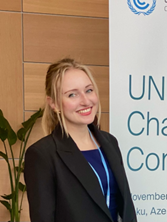 Bianca Garvin is a young professional working in shipping decarbonization at the Global Maritime Forum, where she engages with industry and public sector stakeholders to catalysze the maritime sector’s transition to future fuels and decarbonization. In addition to this role, she is active within the YOUNGO Finance & Markets working group, where she follows progress on UNFCCC negotiations related to climate finance. As a member of the COP29 Coordination Team of the Finance & Markets Working Group, she has been writing the position on Art. 2.1.c negotiations.
Bianca Garvin is a young professional working in shipping decarbonization at the Global Maritime Forum, where she engages with industry and public sector stakeholders to catalysze the maritime sector’s transition to future fuels and decarbonization. In addition to this role, she is active within the YOUNGO Finance & Markets working group, where she follows progress on UNFCCC negotiations related to climate finance. As a member of the COP29 Coordination Team of the Finance & Markets Working Group, she has been writing the position on Art. 2.1.c negotiations.
At COP29 she will be supporting this work, helping with finance side events, coordinating other YOUNGO volunteers, and especially focusing on climate finance negotiations around Article 2.1.c. She is also keen to connect with experts working on the gender-climate nexus within climate finance and to delve further into this topic. She has a special interest in the intersectionality of climate and gender equality, which she tries to integrate into her different activities. As former Youth Ambassador for the Global Alliance of Universities on Climate (GAUC) program, she researched gender-responsive climate finance and gave a guest lecture on the topic. She was also formerly Co-President of UN Women’s HeforShe organization at her university. She holds a BA in Social Sciences from Sciences Po and a MSc Climate Change, Management and Finance from Imperial College London.
Originally Finnish and Danish, she is based in London and has spent time studying and working in France and South East Asia.
Tuba Rafi
 Tuba Rafi is an MPhil scholar, social worker and Program Officer at DASTAK Women Rights and Awareness Foundation.
Tuba Rafi is an MPhil scholar, social worker and Program Officer at DASTAK Women Rights and Awareness Foundation.
DASTAK won the 2023 Gender Just Climate Solutions award in the transformational category along with Baithak – Challenging Taboos for their joint project “Framework for gender-equitable climate disaster response” in Pakistan.
In their efforts to use gender-just approaches to respond to increasingly disastrous floods in Pakistan, Baithak – Challenging Taboos and the DASTAK Foundation have developed a strategic and comprehensive framework tool offering guidelines for gender-equitable climate crisis responses. These responses are designed to meet the gender-specific needs of women and girls during climate crises and prioritizse their health, well-being and safety. Before its creation, extensive stakeholder engagement was conducted, including social listening sessions involving 30,000 women and girls, direct consultations with 5,000 individuals affected by floods, and collaboration with 40 grassroots organisations and experts.
Tuba Rafi works on initiatives addressing gender equality, feminist social justice, and women’s rights, focusing on gender-based violence prevention, sexual and reproductive health rights, and comprehensive sexuality education. Tuba also leads impactful projects such as the Amplify Feminism Lab, #GuyTalkPakistan and Project Marham. She aims to advocate for intersectional climate justice and amplify women’s leadership in climate action by connecting with global leaders to foster collaborative solutions for a sustainable and equitable future.
Shillah Raymond
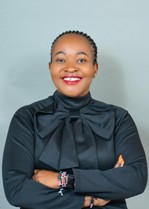 Shillah Raymond is the executive director of the Kutoka Urban Slums initiative, where she leads impactful programs that drive community resilience, youth empowerment and sustainable urban development across underrepresented urban communities in Kenya. Passionate about addressing systemic inequalities, Shillah collaborates with local and international partners to advocate for inclusive policies and grassroots solutions that empower marginalized populations.
Shillah Raymond is the executive director of the Kutoka Urban Slums initiative, where she leads impactful programs that drive community resilience, youth empowerment and sustainable urban development across underrepresented urban communities in Kenya. Passionate about addressing systemic inequalities, Shillah collaborates with local and international partners to advocate for inclusive policies and grassroots solutions that empower marginalized populations.
Attending COP29 provided a vital platform to amplify the voices of urban slum communities in the global climate agenda. This opportunity enabled her organization to highlight the unique challenges faced by these communities while fostering partnerships for sustainable, climate-resilient solutions.
If you would like to hear more about COP29 from Alexandra Vo, Meg Brew, Sheila Doucet, Ayuska Motha and two of our youth delegates, Iman Berry and Bianca Garvin, as well as Anisa Abibulloeva, one of this year’s Gender Just Climate Solutions winners, please join the virtual webinar on January 22, 2025 (6pm CET).
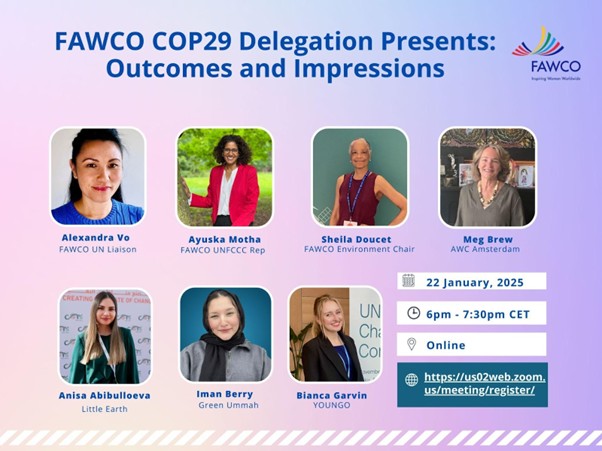
A huge thank you to all of our non-FAWCO delegates for all of their incredible work in their communities and at the UN level. On behalf of FAWCO, we are honored to have been able to facilitate your participation at COP29 in this small way.
Ayuska Motha, a long-time member of AIWC Cologne, has been FAWCO’s UNFCCC Representative for eight years, representing FAWCO at seven COPs and eight UNFCCC subsidiary bodies, amongst other meetings. She also acts as FAWCO’s Liaison to the Women and Gender Constituency and has acted as the head of delegation for the past four years. Ayuska has been following many interrelated issues such as gender, finance, carbon markets and false solutions, but is interested overall in identifying trends, developments and blockages within the UNFCCC process. She is also interested in uplifting small-scale, community-led solutions to the climate crisis and is looking for holistic, effective ways to slash greenhouse gas emissions.
Photos reprinted with permission.
